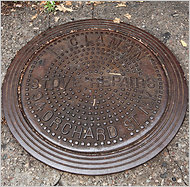
News » NYTimes Blog Post Mentions Historic University Settlement Advocacy EffortsAs advocacy efforts continue throughout the Settlement and our community as a whole, it's interesting to note that we are continuing an ongoing tradition; advocacy has been a part of the Settlement's work since the very early days, 125 years ago. Check out this NYTimes CityRoom blog post that includes a petition to President Taft along with a quote from University Settlement's head worker. See below for the full text, and click here for a link to the blog - which includes the letter and petition.
 Century-Old Immigration Debate Has Familiar Sound By Sam Roberts Until recently, Morris Claman's legacy to New York has been the few surviving manhole and coal chute covers in Manhattan and Brooklyn that bear the logo of his stove parts and repair business on Orchard Street as well, of course, as his descendants. But it turns out that he had left something else behind: his anger over an immigration debate that is still being echoed today. Mr. Claman and some of his fellow Lower East Siders were angered at comments by William Williams, the federal commissioner of immigration for the Port of New York, who in his June 30, 1911, annual report lamented the influx from Southern and Eastern Europe of "backward races with customs and institutions widely different from ours and without the capacity of assimilating with our people as did the early immigrants." Singling out residents of Elizabeth, Orchard, Rivington and East Houston Streets, the commissioner complained that they came to America with "filthy habits and are of an ignorance which passes belief" and "often herd together, forming in effect foreign colonies in which the English language is almost unknown." Mr. Claman, himself an immigrant from Eastern Europe, joined a citizens committee of other neighborhood residents in a letter and petition to President William Howard Taft demanding that Mr. Williams retract his remarks. The commissioner, a Republican who cleaned up corruption on Ellis Island, but also favored rigid restrictions on "low-grade immigrants," had been reappointed by Mr. Taft after being forced out by President Theodore Roosevelt of New York. In 1909, deportations rose 35 percent, in part because Mr. Williams concluded that "in most cases it will be unsafe for immigrants to arrive with less than $25 in addition to their railroad ticket to their final destination." He pointed out that the steamship Raglan Castle had recently landed with 305 steerage passengers - 70 arrived with no money at all. The committee's petition was discovered by a reporter rummaging through the National Archives. No response from the president turned up. But the commissioner's remarks touched off a debate in Congress, fueled, in part, by the committee's accompanying survey of the average 594 persons living on each of the streets' 57 blocks. (Morris Claman's last name was spelled "Claiman" by whoever typed the petition.) "Although most of the residents of these streets are of foreign birth," the committee wrote, "they have come to this country for the purpose of establishing permanent homes, of rearing and educating their children as good Americans and of enjoying the blessings of freedom, at the same time assuming and performing the obligations which residence and citizenship entail." The committee counted 104 religious congregations, 53 Hebrew Schools and 9 public schools; 117 grocery stores, 112 candy stores, 107 restaurants, 93 butcher shops, 70 saloons, 36 newsstands and only 2 pawn shops; 109 men's and ladies' tailors, 78 barbers, 40 dentists, 23 lawyers and 11 cantors and rabbis. The large number of shops selling luxury goods and the small number of pawn shops demonstrated the residents' thrift and their capacity "to save money over and beyond living expenses," the committee said. Children deposited over $7,000 in a bank connected with the University Settlement, whose head worker, Robbins Gilman, was quoted as saying: "There is no evidence that the United States is likely to suffer from a civic point of view as a result of the addition of citizens from the children and other minors of this district. On the contrary, every indication points to an enrichment of citizenship." The committee also reported that the Seward Park Branch of the New York Public Library circulated half a million books in 1911 (more, it said, than any other branch library in the world), that at Public School 188 on Houston and Lewis Streets, only 11 of the 1,500 boys older than 10 did not have library cards, that only 8 of the school's 2,500 boys were arrested during the year, mostly on trivial charges, and that only one "evinced serious moral delinquency." Moreover, on average, newly arrived foreign-born students are "sufficiently qualified in English to enter the general classes and to keep up with the work" within two or three months. Mr. Claman's store was at 97 Orchard Street, now home to the Lower East Side Tenement Museum (The store later moved to 94 Orchard, if you're wondering why the coal chute cover in the photo above shows that address. The family business was eventually taken over by Morris's son Irving, which explains the "I Claman" on the cover.) Researching an exhibit on 97 Orchard's former shopkeepers, David Favaloro, the museum's director of curatorial affairs, found that the store was inherited by Mr. Claman's son, Irving, who raised his family in Flatbush, Brooklyn. Irving's son, Morris, known as Mike, raised his children in suburban Westchester. His son graduated from Harvard Law School, his daughter from the Massachusetts Institute of Technology with a doctorate in neurophysiology. Mike Claman, an 83-year-old retired furniture designer and manufacturer and amateur painter, lives in Manhattan. He was asked the other day whether immigrants today differ from the waves of Jews and Italians who arrived a century ago. "No," he replied. "They have many of the same traits: hopefulness, a basic truthfulness, an ethic of rolling up their sleeves, not complaining and looking straightforward at the opportunities of life." |


